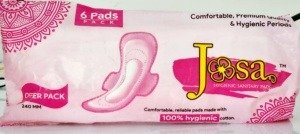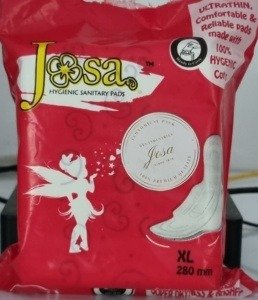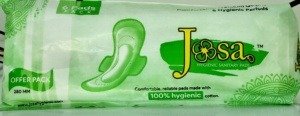
Ria Patil Chandray speaks about her brand Josa, which ensures that women have access to comfort with care
Located in the Thivim Industrial Estate, Gia Industries is a local venture that manufactures high-quality bio-degradable sanitary napkins in Goa. A brainchild of Ria Patil Chandray, Josa, a brand name derived from the Sanskrit josha which stands for ‘woman,’ is a brand that seeks to provide comfortable, hygienic, environment-friendly, and affordable sanitary pads to the ladies of India.
The founder, Ria, is an electronics engineer and holds a Masters degree in computer management from Pune University. Having worked in the corporate sector for well over 14 years, she has dedicated her time and efforts into promoting women’s welfare in the country. Not only is she involved with various self-help-groups and social welfare clubs, Ria has also taken the initiative to create awareness about safe hygiene practices among women of all ages. 
A lady who loves doing things for the community, Ria was appointed ambassador for the Nirmal Raksha Abhiyan
in 2018 by Menaka Gandhi (Member of Parliament, Government of India). She was later approached by a multitude of companies who wanted her to promote their ‘bio-degradable’ sanitary products. Being a person with a technical background, Ria discovered that the resources used by these c o m p a n i e s who to manufacture their sanitary pads were non-biodegradable. The pads were mainly made of synthetic materials with a polyropelene (PP) top-sheet.
These synthetic sanitary pads can cause infertility and a variety of other health problems for women. If not replaced regularly, they can lead to rashes, allergies, and infections. Their synthetic linings can result in the increased risk of exposure to a number of microorganisms that can enter the blood stream and cause septic shock. The environmental
threat due to their non-biodegradable nature is equally alarming. 
Besides this, a majority of women in India use rags and cotton cloths to make a home-made pad that takes care of their sanitation needs during periods. It is an inexpensive and easy solution as these pads can be washed and reused again. However, what the women are unaware of is that these rags can cause cervical cancer and other gynaecological problems. In some cases, the infection caused due to this unsanitary practice can lead to death. Women of all ages are forced to make this choice as they do not have any other options or the money to afford sanitary napkins. It was after this revelation that Ria got the idea of setting up a factory that not only produced biodegradable and affordable sanitary napkins, but also provided employment to the rural women of Goa.
Setting up and getting the factory running wasn’t easy. When asked about the toughest part of the whole endeavour, Ria says that it was the manufacturing process. The machines that were used to make the sanitary napkins
required skilled labour and constant monitoring due to its hygienic nature.
Overall, it took Ria approximately six months to get the product from “A to A++,” that is, to absolute perfection.
Ria is self-involved with Josa in every step of the way, whether it be the production or the marketing of the product. She maintains a one to one contact with most of her customers. The product is further improved according to their suggestions and feedback. In essence, Josa has a personal touch that is rarely found anywhere in the market. 
Josa’s unique selling point is the organic and biodegradable nature of the sanitary pads, which is a rare occurrence in India. It helps keep Ria ahead of her competitors in the market whose sanitary napkins are mostly made of synthetic
materials and other products which are supposedly biodegradable. In contrast, Josa is a 100% bio-degradable and organic sanitary product. In addition to this, the company also keeps in mind the customer’s requirement for a soft-feel, extra-absorbent, no rash, chemical-free, sanitary product which keeps it one step ahead of its competitors.
‘Persistence, patience, and progress’ is the mantra on which Josa was founded. These three principles along with family support, self-motivation, a zeal for protecting the environment and inculcating responsible hygiene practices in women, were what has led to the success of this enterprise





